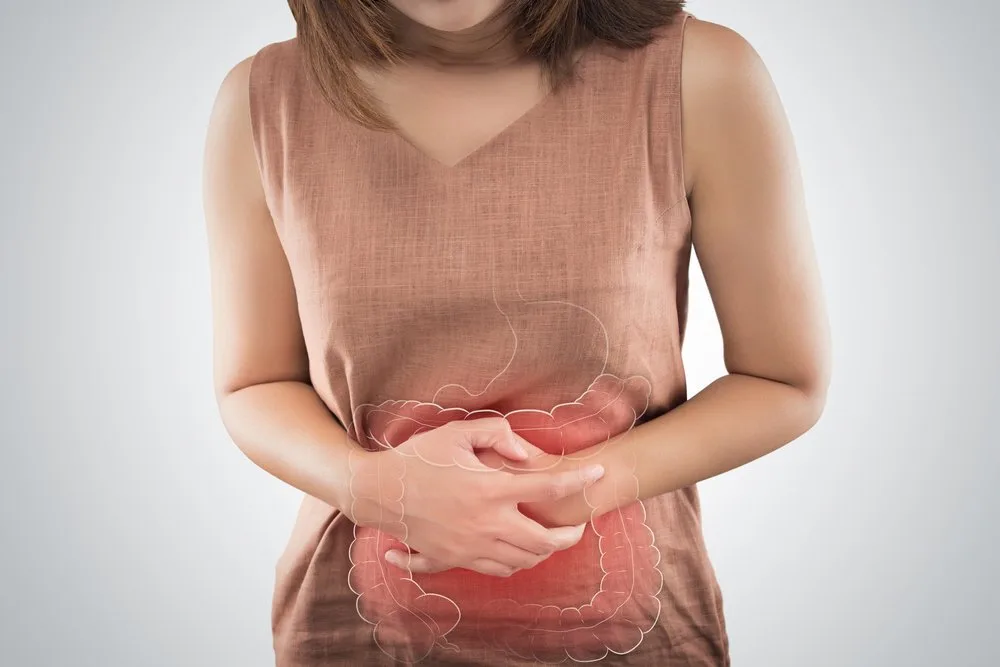When moving your bowels becomes an emergency every time you have to use the restroom, that’s a clear indicator that you may have Irritable Bowel Syndrome (IBS). A common disorder, IBS, affects the large intestine, causing considerable pain, cramping and diarrhea or constipation, and other symptoms. Managing the symptoms with diet and medication is the best way to treat IBS.
IBS often occurs after severe diarrhea (gastroenteritis) caused by bacteria or a virus. Too many bacteria in the intestines may also cause IBS to develop. And, life stress is a predominant cause of the disease, especially stress from childhood.
Whatever the cause, the symptoms are the same. Take a look at the symptoms below to learn if you or a loved one has IBS.
5 Symptoms of Irritable Bowel Syndrome
1. Pain and Cramping
As the most common symptom of IBS, pain, and cramping mostly in the lower abdomen are often the best indicators for doctors to diagnose the disorder.

Photo by Sydney Sims on Unsplash
Usually, it’s the brain and gut that controls digestion. Using hormones, nerves, and signals released by the good bacteria in your stomach, the mind and gut work together to cause digestion.
The pain in your gut from IBS is because of impaired communication between the hormones, nerves, and signals in the digestive tract.
Once you have a bowel movement, the pain tends to cease.
Diets low in FODMAPs, wheat, and beans, etc., tend to keep IBS abdominal pain at a minimum. Bowel relaxants like peppermint oil, cognitive behavior therapy, and hypnotherapy can also control IBS abdominal pain. If these treatments don’t work, a gastroenterologist may prescribe medications specifically for IBS.
2. Diarrhea and/or Constipation
There are three types of IBS — diarrhea, constipation, or both. Diarrhea-prone IBS affects one-third of patients with the disorder. Patients with IBS report having a sudden and alarming need to move their bowels. The bowel movement tends to be loose and watery and may contain mucus.
A study of 200 adults found that the participants had an estimated 12 bowel movements weekly. That’s about twice as much as people without IBS.
On the flipside, constipation can also occur with IBS. It is the most common type of IBS, affecting about 50 percent of patients. It’s defined as having three or fewer bowel movements weekly.
Impaired communication between the brain and gut causes the stool’s standard transit time to speed up or slow down. When the stool moves slowly through the digestive tract, more water is absorbed by the bowel, making it difficult to pass.
IBS constipation is also accompanied by severe abdominal pain that eases when you have a bowel movement.

Photo by Giorgio Trovato on Unsplash
In addition to the treatments mentioned above, IBS treatment should also include exercise, drinking more water, eating soluble fiber, taking probiotics, and limiting the use of laxatives can help reduce constipation due to IBS.
Finally, people with IBS can also have combined symptoms that alternate between diarrhea and constipation. Mixed IBS affects approximately 20 percent of IBS patients. Patients that have alternating diarrhea and constipation tend to have more frequent and intense symptoms.
3. Bowel Movement Changes
With IBS, slow-moving stool passing through the intestine tends to become dehydrated as the bowel absorbs water. As a result, stool hardens, causing increased symptoms of constipation.
On the other hand, when stool moves fast through the intestine, there is less time for the water to be absorbed, leaving IBS patients with loose and watery stool.
Additionally, mucus is often found in IBS patients’ stool, which isn’t typically found in other types of constipation that aren’t associated with IBS.
4. Gas and Bloating
The discomfort from gas and bloating often is associated with IBS. Gas occurs when digestion alters. The excess of gas causes bloating.
Most patients with IBS report gas and bloating. In fact, in a study using 337 IBS patients, 83 percent had these symptoms.
Gas and bloating are common in women and those with constipation-prone and mixed IBS.
Treatment includes limited FODMAP foods, such as those containing lactose.
5. Intolerance to Food
Certain foods often trigger IBS symptoms. Seventy percent of IBS patients report food intolerance.
Most people with IBS avoid the foods that trigger their symptoms. Every person has different trigger foods. But, the most common trigger foods are the FODMAPs, as well as lactose and gluten.

Photo by Jasmin Sessler on Unsplash
You Think You Have IBS, Now What
If you’re experiencing symptoms associated with IBS, you must consult your doctor first. Your doctor can rule out other disorders and diseases that look like IBS. In turn, a diagnosis of IBS can help your doctor treat you effectively.
For your doctor to diagnose IBS, you must report recurring abdominal pain for six months and weekly pain for three months. Other symptoms, such as relief of pain after a bowel movement, can also tell your doctor if you have IBS.
Once diagnosed with IBS, your doctor will begin treatment, including lifestyle changes, such as a change in diet, increased exercise, stress relief, and increased water intake. When these treatments don’t work in more severe cases, your doctor can prescribe medications to control IBS.
Who is the author?
 Derek has been closely studying the Health industry trends for quite some time.
Derek has been closely studying the Health industry trends for quite some time.
Intrigued by the booming growth of this sector, he takes interest in penning down
his views providing quality insight on current health trends and the pushing people
towards a healthy lifestyle through his writings.





![women [longevity live]](https://longevitylive.com/wp-content/uploads/2020/01/photo-of-women-walking-down-the-street-1116984-100x100.jpg)










